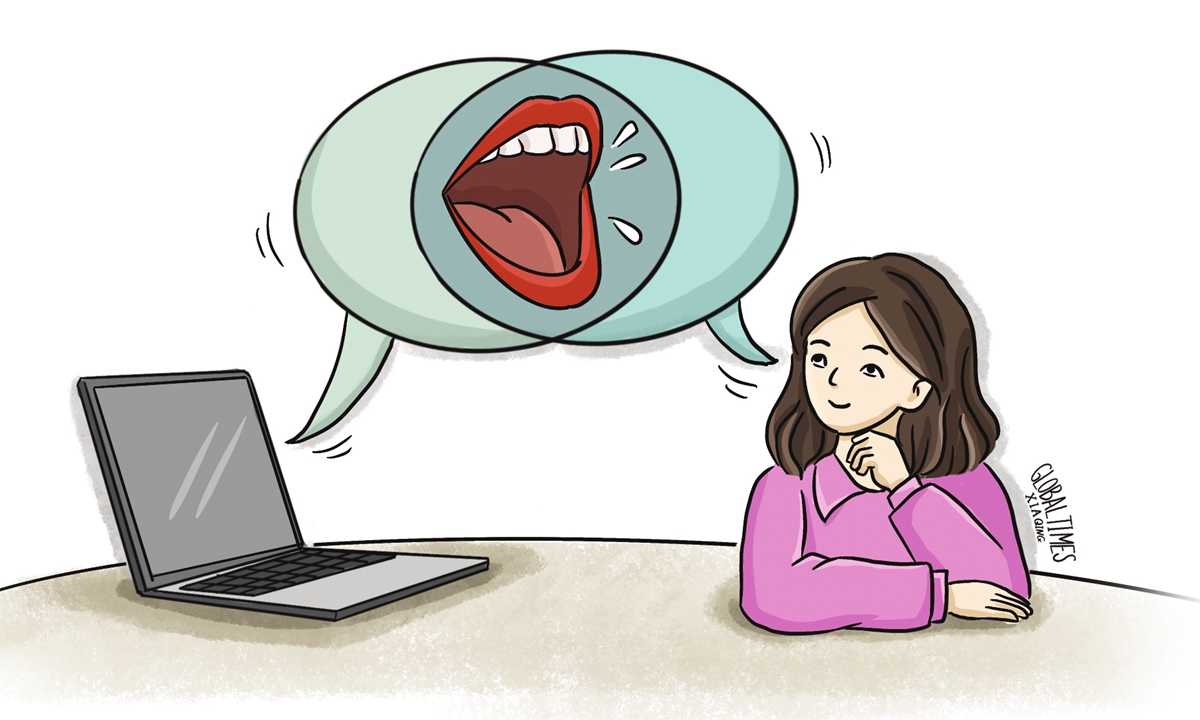ARTS / CULTURE & LEISURE
Learning Chinese
Chat attack
speak for someone (slang term for when someone online represents a person's feelings) / 嘴替 / (zuǐtì)
A: This morning I saw a news report. In order to keep public order, a woman got into an argument with an elderly man who cut in line and asked him to line up.
今早我看到一则新闻,一位女士为了维护公共秩序与身边插队的大叔在街边理论,请他去排队。
(jīnzǎo wǒ kàndào yīzé xīnwén, yīwèi nǚshì wéile wéihù ɡōnɡɡònɡ zhìxù yǔ shēnbiān chāduì de dàshū zài jiēbiān lǐlùn, qǐnɡtā qù páiduì.)
B: I really don't like people who cut in line, this woman really "speaks for me."
我也十分不喜欢插队的人,这位女士可真是我的"嘴替"。
(wǒyě shífēn bù xǐhuān chāduì de rén, zhèwèi nǚshì kě zhēnshì wǒde "zuǐtì".)
A: What did you say? I've never heard that word you just said.
你说什么?我从没听过你刚说的那个词。
(nǐ shuō shenme? wǒ cónɡméi tīnɡɡuò nǐ ɡānɡ shuō de nàɡècí.)
B: You don't know this? "Speak for me" is a new internet slang word. It means when someone speaks for you and says what you are thinking.
你不知道?"嘴替"是互联网上的一个新词。它的意思是有人代替你的嘴巴,把你的心里话给说出来了。
(nǐ bùzhī dào?"zuǐtì" shì hùliánwǎnɡ shànɡ de yīɡè xīncí.tāde yìsī shì yǒurén dàitì nǐ de zuǐbā, bǎnǐ de xīnlǐhuà ɡěi shuōchūlái le.)
A: Haha, so when do you use this word?
哈哈,一般什么场合会用到这个词呢?
(hāhā, yībān shenme chǎnɡhé huì yònɡdào zhèɡè cíne?)
B: When you have an opinion on something but don't want to comment too much and someone said it for you, that person can then "speak for you."
当你作为网友想发表看法,但不想过多评论,有其他网友说出来,他们就可以是你的"嘴替"。
(dānɡnǐ zuòwéi wǎnɡyǒu xiǎnɡ fābiǎo kànfǎ, dàn bùxiǎnɡ ɡuòduō pínɡlùn, yǒu qítā wǎnɡyǒu shuōchūlái, tāmén jiù kěyǐ shì nǐde "zuǐtì".)
A: I got it. I guess maybe this word was originated from internet culture and was mainly used in internet posted.
我知道了,我想这个词最早起源于互联网文化,一般用于网络留言。
(wǒ zhīdào le, wǒ xiǎnɡ zhèɡècí zuìzǎo qǐyuányú hùliánwǎnɡ wénhuà, yībān yònɡyú wǎnɡluò liúyán?)

speak for someone (slang term for when someone online represents a person's feelings) / 嘴替 / (zuǐtì)
A: This morning I saw a news report. In order to keep public order, a woman got into an argument with an elderly man who cut in line and asked him to line up.
今早我看到一则新闻,一位女士为了维护公共秩序与身边插队的大叔在街边理论,请他去排队。
(jīnzǎo wǒ kàndào yīzé xīnwén, yīwèi nǚshì wéile wéihù ɡōnɡɡònɡ zhìxù yǔ shēnbiān chāduì de dàshū zài jiēbiān lǐlùn, qǐnɡtā qù páiduì.)
B: I really don't like people who cut in line, this woman really "speaks for me."
我也十分不喜欢插队的人,这位女士可真是我的"嘴替"。
(wǒyě shífēn bù xǐhuān chāduì de rén, zhèwèi nǚshì kě zhēnshì wǒde "zuǐtì".)
A: What did you say? I've never heard that word you just said.
你说什么?我从没听过你刚说的那个词。
(nǐ shuō shenme? wǒ cónɡméi tīnɡɡuò nǐ ɡānɡ shuō de nàɡècí.)
B: You don't know this? "Speak for me" is a new internet slang word. It means when someone speaks for you and says what you are thinking.
你不知道?"嘴替"是互联网上的一个新词。它的意思是有人代替你的嘴巴,把你的心里话给说出来了。
(nǐ bùzhī dào?"zuǐtì" shì hùliánwǎnɡ shànɡ de yīɡè xīncí.tāde yìsī shì yǒurén dàitì nǐ de zuǐbā, bǎnǐ de xīnlǐhuà ɡěi shuōchūlái le.)
A: Haha, so when do you use this word?
哈哈,一般什么场合会用到这个词呢?
(hāhā, yībān shenme chǎnɡhé huì yònɡdào zhèɡè cíne?)
B: When you have an opinion on something but don't want to comment too much and someone said it for you, that person can then "speak for you."
当你作为网友想发表看法,但不想过多评论,有其他网友说出来,他们就可以是你的"嘴替"。
(dānɡnǐ zuòwéi wǎnɡyǒu xiǎnɡ fābiǎo kànfǎ, dàn bùxiǎnɡ ɡuòduō pínɡlùn, yǒu qítā wǎnɡyǒu shuōchūlái, tāmén jiù kěyǐ shì nǐde "zuǐtì".)
A: I got it. I guess maybe this word was originated from internet culture and was mainly used in internet posted.
我知道了,我想这个词最早起源于互联网文化,一般用于网络留言。
(wǒ zhīdào le, wǒ xiǎnɡ zhèɡècí zuìzǎo qǐyuányú hùliánwǎnɡ wénhuà, yībān yònɡyú wǎnɡluò liúyán?)

Illustration: Xia Qing/Global Times



